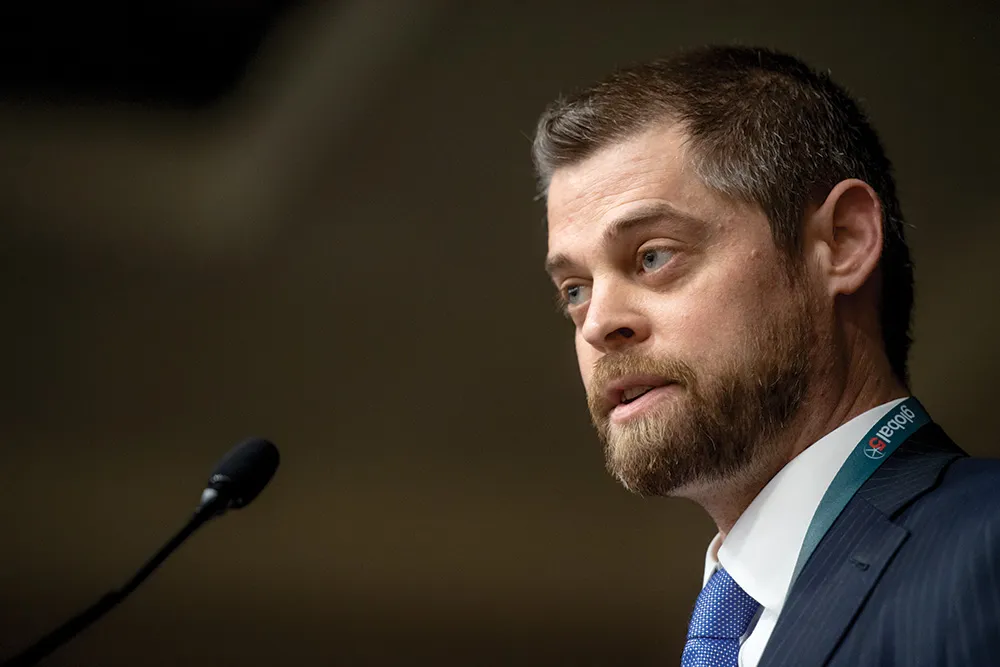ITS America's appointment of a Director of Environmental Affairs signals a major new focus
March 13, 2012
Read time: 4 mins

RSS
That she hasn't wasted any time in getting the programme underway is not surprising when you look at her background. Six weeks into the role, as this issue of ITS International was going to press, the first meeting of ITS America's Environmental Task Force (ETF), with a dozen members from diverse backgrounds and sectors and chaired by Larry Yermack of134 Telvent Farradyne, was about to hold its inaugural meeting. Included on a packed agenda was: formalisation of the objectives of the ETF; creation of sub-committees; strategic alliances both in the US and overseas; ways of highlighting ITS and sustainability at the World Congress in New York, and a range of other tasks.
And she got results. Bellas handled the largest Clean Air Act action - against coal-fired powerplants - ever filed by the United States. As she told ITS International, "In the end, we took more than one million tons of pollution a year out of the air." Obviously a job well done, but in talking to Bellas you quickly realise it's not just a job. Environmental issues are her passion.
"This job has provided an amazing opportunity to work with government (the Department of Transportation, the1999 Environmental Protection Agency, other agencies and organisations) and private industry to tackle an area that has largely been ignored up to now," Bellas says.
By that she means that much of the effort of tackling emissions from transportation has focused on fuel quality and fuel efficiency. Certainly, efforts to develop cleaner fuel and increase fuel consumption are critically important in addressing the environmental impact of surface transportation. But ITS technologies can also make a significant contribution. Indeed, she acknowledges, they already do. "ITS technologies that, for instance, mitigate congestion or create efficiencies in the transport system, lessen environmental harm as well as providing a range of other benefits."
Indeed, as she points out, many ITS America members already have active environmental programmes. Here she cites a few examples: Telvent Farradyne's sustainability programme; The American Association of State Highway and Transportation Officials's (AASHTO) Center for Environmental Excellence; Caltrans's sustainability programme; HELP Inc.'s efforts to measure emissions reductions from electronic weigh stations.
Moreover, what has gratified Bellas in the few short weeks since she joined ITS America has been the response she has received. "So far people are very engaged with this new direction and leadership from ITS America. I've received many emails from members, and former members, who are saying they are glad that ITS America is handling this issue," Bellas says.
The meeting will also establish four subcommittees. Science & Technology will be tasked with: quantifying emission reductions; promote research on significant environmental issues; and it will facilitate dialogue about best practices. The Legislative subcommittee will be tasked with delivering the message that transportation technology promotes sustainability. Environmental Policy & Regulations will monitor federal environmental laws, regulations and guidance as well as encourage programmes that protect the environment. Meanwhile, the DOT (Department of Transportation) Policy & Regulation subcommittee will support DOT programmes, policy and regulations that integrate ITS as a solution to environmental transportation challenges.
Leslie Bellas, ITS America's new General Counsel and Director of Environmental Affairs, holds a JD from the Georgetown University Law Center and a BA in Political Science from Barnard College, Columbia University.RSS
ITS America's appointment of a Director of Environmental Affairs signals a major new focus
The Board of Directors of ITS America has identified a major area that the Association, and the industry, should focus on - sustainability. Recognising that the environment, and the impact of transportation on it, is a significant issue that ITS technologies could, and should, address, at the end of March a new post was created. Leslie Bellas was recruited as Director of Environmental Affairs and General Counsel. She is now responsible for developing and implementing an environmental programme that identifies, quantifies, and captures the environmental benefits of ITS.That she hasn't wasted any time in getting the programme underway is not surprising when you look at her background. Six weeks into the role, as this issue of ITS International was going to press, the first meeting of ITS America's Environmental Task Force (ETF), with a dozen members from diverse backgrounds and sectors and chaired by Larry Yermack of
Impeccable credentials
Bellas has impeccable credentials to lead this key ITS America initiative. As the press release announcing her appointment pointed out, she spent 10 years as a trial attorney working in the Environmental Enforcement Section at the US Department of Justice.And she got results. Bellas handled the largest Clean Air Act action - against coal-fired powerplants - ever filed by the United States. As she told ITS International, "In the end, we took more than one million tons of pollution a year out of the air." Obviously a job well done, but in talking to Bellas you quickly realise it's not just a job. Environmental issues are her passion.
"This job has provided an amazing opportunity to work with government (the Department of Transportation, the
By that she means that much of the effort of tackling emissions from transportation has focused on fuel quality and fuel efficiency. Certainly, efforts to develop cleaner fuel and increase fuel consumption are critically important in addressing the environmental impact of surface transportation. But ITS technologies can also make a significant contribution. Indeed, she acknowledges, they already do. "ITS technologies that, for instance, mitigate congestion or create efficiencies in the transport system, lessen environmental harm as well as providing a range of other benefits."
Upping the ante
So ITS America, and its membership, whether private corporations, public agencies, or academic institutions involved in the research, development and design of technologies, are, and have been, ameliorating environmental impacts, but only as a by-sproduct. Bellas's appointment ups the ante considerably and brings the whole environmental issue into sharp focus.Indeed, as she points out, many ITS America members already have active environmental programmes. Here she cites a few examples: Telvent Farradyne's sustainability programme; The American Association of State Highway and Transportation Officials's (AASHTO) Center for Environmental Excellence; Caltrans's sustainability programme; HELP Inc.'s efforts to measure emissions reductions from electronic weigh stations.
Moreover, what has gratified Bellas in the few short weeks since she joined ITS America has been the response she has received. "So far people are very engaged with this new direction and leadership from ITS America. I've received many emails from members, and former members, who are saying they are glad that ITS America is handling this issue," Bellas says.
Priorities
And it is. As she explains, the inaugural meeting of the ITS America Environmental Task Force, along with agreeing a list of priorities for 2008, will categorise the various ITS technologies, best practises and any form of transport technology. "From that we're going to assess if there is an environmental benefit. Then we will look at how you quantify it, using travel demand and emission models. To my knowledge, so far, no one has done that," Bellas says.The meeting will also establish four subcommittees. Science & Technology will be tasked with: quantifying emission reductions; promote research on significant environmental issues; and it will facilitate dialogue about best practices. The Legislative subcommittee will be tasked with delivering the message that transportation technology promotes sustainability. Environmental Policy & Regulations will monitor federal environmental laws, regulations and guidance as well as encourage programmes that protect the environment. Meanwhile, the DOT (Department of Transportation) Policy & Regulation subcommittee will support DOT programmes, policy and regulations that integrate ITS as a solution to environmental transportation challenges.
Leslie Bellas, ITS America's new General Counsel and Director of Environmental Affairs, holds a JD from the Georgetown University Law Center and a BA in Political Science from Barnard College, Columbia University.RSS










